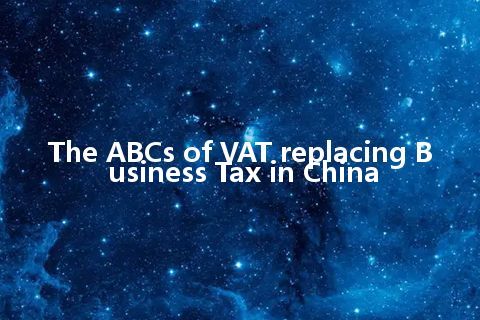Get ready for a big change right on the horizon in China:good bye business tax and hello value added tax. But, it's not quite as simple as that. For many years, China has operated a dual system. VAT has been long imposed on tangible goods, but services are instead subject to business tax.

In 2012, China started a pilot program in Shanghai to extend the scope of VAT to include a variety of services. The program has been gradually expanded from some cities to the entire nation, and eventually, business tax will be replaced by VAT across-the-board from May 1st.
What is the difference between Business Tax and VAT anyway?
Let's take cafes as an example. Under the business tax system, cafes are taxed on the basis of their coffee sales. The sales include not only their profit but also their costs, like rental, decoration, utility, equipment and coffee beans. But VAT works differently. The taxable amount EXCLUDES those material and input costs, hence as the name suggests, tax is levied on just the part that’s “value-added”. So for the manufacturer or service provider, a VAT along with its deductible costs is almost like an incentive program.
Will it impact China's fiscal income?
In the short term, the reform may have an impact on fiscal income. The government estimates that reform can cut about 500 billion yuan, or 77.3 billion U.S. dollars of tax for corporations by the end of 2016.
"The reform will mostly affect local governments because business tax is a major source of income for them. But after business tax is replaced by VAT, which is collected by the Central government, the question is how the tax income will be redistributed between central and local governments," said Shen Yinghua, partner of KPMG Advisory.
How will VAT lessen the tax burden on enterprises?
The VAT system itself is also changing. Before the reform, fixed-assets, such as houses, construction and equipment, were not deductible costs when calculating VAT. But that's no longer the case under the reform. Tax will not be paid on these purchases, and this will further lessen the burden of companies and encourage them to invest in property.
"Consumption type of VAT, which allows fixed-assets to be deductible, is a more advanced VAT. Companies can benefit a lot given the purchase of fixed-asset is a huge capital expenditure. It will also boost the process of property destocking in China," Shen said.
If a business's annual sales are less than 5 million RMB and it’s been categorized as a small-scale taxpayer, the replacement with VAT system can effectively lower its tax payments by 40%.
Will individual customers benefit?
On the minds of many is the question: can the customer buy stuff at a lower price?
"The reform aims at lowering the tax burden and injecting vitality into enterprises, but is not targeting individual consumers directly. Whether to transfer profit to consumers will depend on enterprise themselves," Shen said.